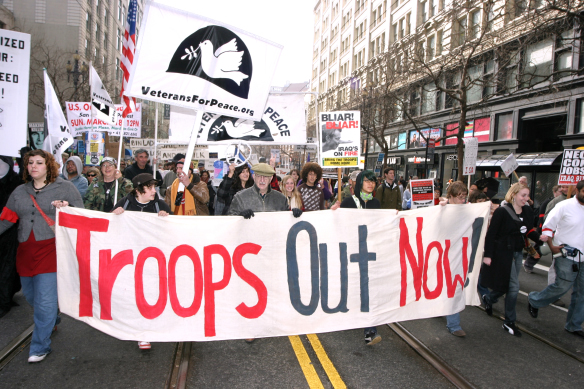 Stopping global warming means cutting air travel. As part of the debate within RESPECT and the movement, Jonathan Neale looks at how this could be done without targeting the poor.
Stopping global warming means cutting air travel. As part of the debate within RESPECT and the movement, Jonathan Neale looks at how this could be done without targeting the poor.Tackling climate change means cutting carbon emissions drastically. We have to start now – that’s clear. But there’s confusion over what to do about air travel.
Half of global carbon emissions come from seven sources – heating buildings, air conditioning, cars, trucks, petroleum refineries, cement plants and steel plants.
Air travel may seem less important right now. Planes are responsible for 3 percent of carbon emissions globally and 6 percent in Britain.
But air travel puts other, more powerful and rarer greenhouse gases directly into the stratosphere. It’s the fastest growing carbon source.
It’s true that planes now use 70 percent less fuel per mile than they did 40 years ago, and further design changes are possible. But that alone won’t be enough.
One common answer starts by saying cheap flights are the problem – so tax them heavily, and fewer people will fly.
Sounds good. But then only the rich would fly. This is the problem with all green taxes.
There is always another solution that is fairer and cuts more emissions.
For instance, you can tax cars and roads heavily. Then only the rich will drive, and ordinary workers will hate environmentalists.
A better solution is to ban cars in cities and provide excellent public transport. Then you have beautiful cities where parks replace most roads.
Again, if you tax energy and make it expensive to heat houses, the poor and the elderly will freeze. And most people will hate environmentalists every time they open their bill.
But if the government gives grants to insulate every house, we can cut energy use from heating by more than half.
Arnold Schwarzenegger’s California is building one million solar roofs. We could build ten million in Britain.
The way to stop global warming is almost always not to cut what we have, but to do things differently. So it is with air travel. Here are some social justice solutions that will work:
First, ban all flights in Europe. But don’t make people give up their holidays. Instead have subsidised trains that prebook until they’re full, like cheap flights.
We would need new train lines. Very fast trains emit too much carbon. But ordinary 125 mph trains as we have in Britain now could go from London to Istanbul in 24 hours and to Delhi in 48.
Those trains will have to be publicly owned. Privately owned railways invest less, cut the number of trains and raise the ticket prices.
What about longer flights? One answer is to ban expensive flights, not cheap ones. Luxury transatlantic seats create four to five times as much carbon.
But much more important, much long haul travel is done by business people. There are not so many of them, but each makes many flights.
The solution is rationing. Let people have one long flight a year. But don’t let them sell that ration – they use it or lose it. The business people can teleconference.
With new railways, that means more travel, more holidays, and less carbon emissions. And if we cover the world with wind farms and solar power, we can run the railways on almost carbon free electricity.
These kinds of massive public works that create jobs and improve people’s standard of living is what will stop climate change.
Otherwise, activists lay themselves open to the right. Look what Tony Blair said about air travel.
He claimed his hands were tied because ordinary people wanted their holidays, and would never stand for airport cuts.
Blair was lying. New Labour builds new airports because the City of London wants business travellers.
Blair posed as the working people’s champion because he could smell the weakness in green taxes – they’re unfair.
We have to build a global mass movement to stop climate change. Time is short, and nothing less will work.
We can’t build that movement by asking ordinary people to sacrifice when the rich don’t.
In almost every area where we have to act on climate change, there is a choice. The conservative answer is to keep the economy the same. Then we have to cut living standards.
The radical answer is to change the way the economy is organised, so we can have both growth and fairness.
None of this means we wait for the new railways before we shut down runways.
We have to fight for both, now.
Cardiff RESPECT will be supporting the UK demonstration for action on climate change on December 6th in London. For transport from Cardiff, e-mail: CardiffCCC@hotmail.co.uk
More info here

















